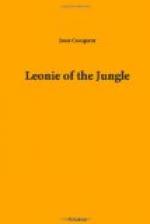Leonie shook her head. “Holiday?”
“Er—yes, almost. You know I simply loved my father, and his very last entry in his book of notes was about you. One line was this: ‘Most interesting—shall go to India and find the ayah.’ He died of heart failure, you know, and he must have written the last line before he died—it is: ’The answer to the problem concerning Leonie Hetth is in the third volume upon——’ There was nothing after that—I thought he would be awfully pleased if I carried out his last wishes, and meant to hunt you up and see if you were still—er—bothered with dreams and then——”
He stopped short as Leonie leapt to her feet and ran back from a wave which had most unexpectedly swirled upon her from behind a rock.
“Quick!” she laughed, “quick—the tide will be in. Where’s the dog?”
The dog was cavorting with a crab in a pool.
“Jingles!” sternly admonished his master, who was heaving everything pell-mell into his haversack. “By the way, what became of Jingles the first?”
A shadow crept into Leonie’s eyes as she thought of the pain and disaster she invariably seemed to bring to those she loved most.
“He—he was run over—it was my fault, I whistled him across the road and a car caught him. If we hurry,” she continued, “we shall be in time for tea—Auntie will love to see you again!”
“Oh! of course—I’d almost forgotten her—will she?”
CHAPTER XVII
“He that rebuketh a wicked man getteth
himself a blot!”—The
Bible.
By all the ill-luck in the world Sir Walter Hickle was sitting in the patch called the garden, turning a small parcel elatedly over and over in his pocket, as Leonie, and her companion, and the dog came sliding down the hill towards the cottage.
For the time being Leonie had totally forgotten the proceedings of the night before, which had metamorphosed her radiant self from a free into a bond woman.
“Oh!” she said, putting one hand unexpectedly on Jan Cuxson’s arm and digging her stick fiercely into the ground, as the man in the garden half rose from his chair and sank back with a frown.
“Oh!” she repeated.
“Tired, dear?”
Neither of them noticed the little endearing word which had slipped out so naturally, but Leonie’s face was wan and her eyes were dead as she dragged herself down the last few yards, while her aunt fluttered down to the gate to meet them, with her mind and skirts in a whirl.
“Jan Cuxson!” she exclaimed, offering a limp hand, and “How very nice,” she continued, lying quite successfully. “I should have known you anywhere. Do come in and have tea!”
And in the same breath, and with that strange cruel cunning of the shallow mind, which is the abortive twin of decent feminine intuition, she leapt at the difficulty she saw threatening, and tried to dispel it.




